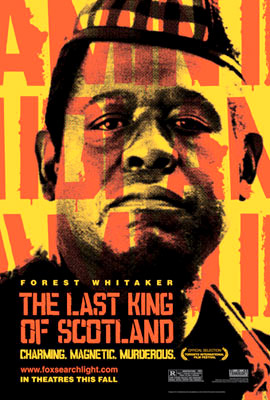| Available at Amazon: Giles Foden, The Last King of Scotland (1998) |
The film, somewhat misleadingly, opens with words to the effect that the story is based on real life. To create the character of the Scottish doctor, Nicholas Garrigan, who becomes personal physician to one of Africa's most notorious dictators, Foden drew on the life of Bob Astles, who was a close enough adviser to Amin to be known as his "White Rat" (Garrigan is called Amin's "White Monkey" in the movie). Foden apparently also drew on the testimony of Henry Kyemba, Amin's Health Minister, who managed to escape Uganda and was not murdered as the movie's health minister, Jonah Wasswa (Stephen Rwangyezi). But Dr. Garrigan, a clueless Scotsman who backs into being personal adviser to Idi Amin, is mostly a fiction.
 To be sure, Idi Amin actually did many of the things that happen, conflated by the screenplay from the lives of other people. What the film tries to pass off as real life is a reconstruction made with dramatic sense. The reality of Amin's crimes had none of this glamor and narrative drive, but instead probably had the boring normality that Hannah Arendt famous characterized as the banality of evil. It took me a while to recognize the actor who plays Garrigan, Scottish actor James McAvoy, but I eventually identified that well-meaning face as that of Mr. Tumnus, the nervous but kind-hearted satyr in The Chronicles of Narnia: The Lion, the Witch, and the Wardrobe. This role has certain similarities, in that people, even Amin, innately trust that handsome face, blue eyes, and charming accent, although Garrigan is really up to no good. He just does not know it, making his mistakes mostly through negligent ignorance, a carelessness captured admirably by McAvoy.
To be sure, Idi Amin actually did many of the things that happen, conflated by the screenplay from the lives of other people. What the film tries to pass off as real life is a reconstruction made with dramatic sense. The reality of Amin's crimes had none of this glamor and narrative drive, but instead probably had the boring normality that Hannah Arendt famous characterized as the banality of evil. It took me a while to recognize the actor who plays Garrigan, Scottish actor James McAvoy, but I eventually identified that well-meaning face as that of Mr. Tumnus, the nervous but kind-hearted satyr in The Chronicles of Narnia: The Lion, the Witch, and the Wardrobe. This role has certain similarities, in that people, even Amin, innately trust that handsome face, blue eyes, and charming accent, although Garrigan is really up to no good. He just does not know it, making his mistakes mostly through negligent ignorance, a carelessness captured admirably by McAvoy.However, both the Golden Globes and the SAG Awards nominated the film only for the performance of Forest Whitaker, an actor whose mannerisms have put me off in some of his previous films. (Acting in Battlefield Earth does not help his cause.) Whitaker prepared intensively for this role, undertaking linguistic and accent work which complement his natural physical similarity to Amin. It is certainly a good performance, but the major impression is left by Amin the person -- what a sick, twisted piece of work -- more than by Whitaker's craft, at least in my mind. However, for a Best Actor Oscar it may be enough this year, in which Whitaker is shaping up to be the favorite. Peter O'Toole certainly should have gotten a Best Actor award before Venus, so it may be time for the Academy to right a past wrong. (In 1962, for Lawrence of Arabia, O'Toole lost to Gregory Peck in To Kill a Mockingbird -- fair enough -- but in 1968, for The Lion in Winter he lost to Cliff Robertson for Charly? Come on!)
The Last King of Scotland should get nominations for costumes and art direction, because it is is one of the most convincing evocations of the 1970s out there. Even if this is supposed to be Uganda, we are palpably in that decade, the clothes, the hair, the colors: only Ang Lee's magnificent The Ice Storm captured it better without becoming a parody of itself. In the interest of a leaner story, the screenplay could easily go from the opening scenes, in which we see the newly minted Dr. Garrigan cooped up with his stuffy parents, directly into the doctor's meeting with Amin. We do not really need the interlude Garrigan spends with a do-gooder mission in rural Uganda, where he has a near-affair with his lead doctor's wife, played by Gillian Anderson (yeah, whatever happened to her?). This story begins with Amin.
No comments:
Post a Comment